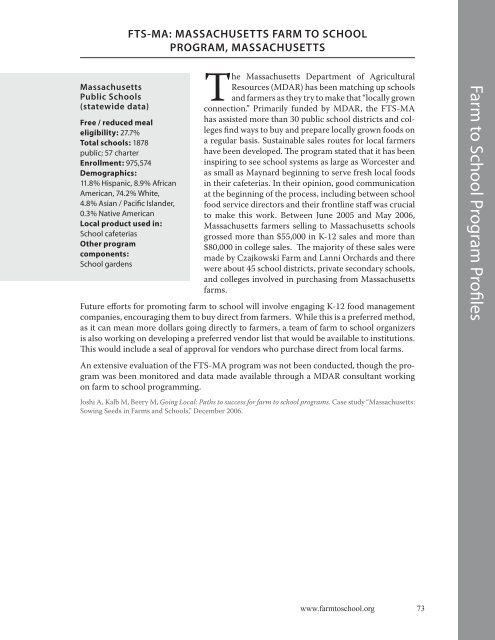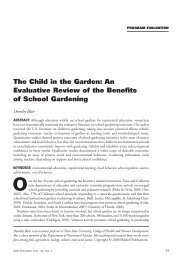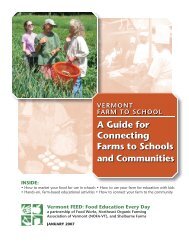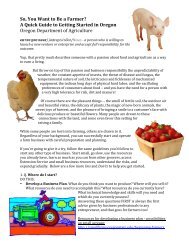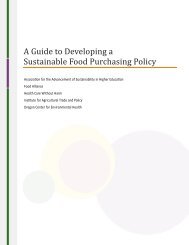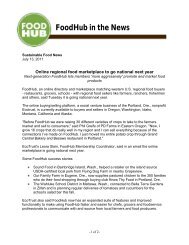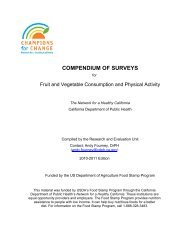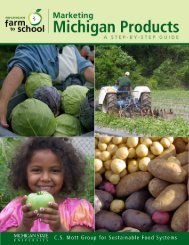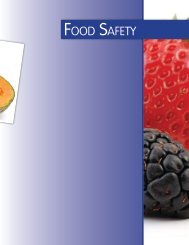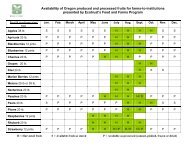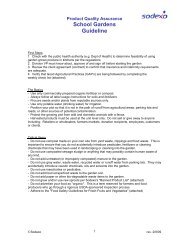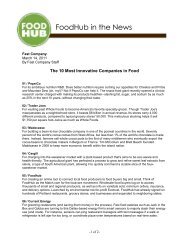eval report cover.indd - New Jersey Farm to School Network Wiki
eval report cover.indd - New Jersey Farm to School Network Wiki
eval report cover.indd - New Jersey Farm to School Network Wiki
Create successful ePaper yourself
Turn your PDF publications into a flip-book with our unique Google optimized e-Paper software.
FTS-MA: MASSACHUSETTS FARM TO SCHOOLPROGRAM, MASSACHUSETTSMassachusettsPublic <strong>School</strong>s(statewide data)Free / reduced mealeligibility: 27.7%Total schools: 1878public; 57 charterEnrollment: 975,574Demographics:11.8% Hispanic, 8.9% AfricanAmerican, 74.2% White,4.8% Asian / Pacific Islander,0.3% Native AmericanLocal product used in:<strong>School</strong> cafeteriasOther programcomponents:<strong>School</strong> gardensThe Massachusetts Department of AgriculturalResources (MDAR) has been matching up schoolsand farmers as they try <strong>to</strong> make that “locally grownconnection.” Primarily funded by MDAR, the FTS-MAhas assisted more than 30 public school districts and collegesfind ways <strong>to</strong> buy and prepare locally grown foods ona regular basis. Sustainable sales routes for local farmershave been developed. The program stated that it has beeninspiring <strong>to</strong> see school systems as large as Worcester andas small as Maynard beginning <strong>to</strong> serve fresh local foodsin their cafeterias. In their opinion, good communicationat the beginning of the process, including between schoolfood service direc<strong>to</strong>rs and their frontline staff was crucial<strong>to</strong> make this work. Between June 2005 and May 2006,Massachusetts farmers selling <strong>to</strong> Massachusetts schoolsgrossed more than $55,000 in K-12 sales and more than$80,000 in college sales. The majority of these sales weremade by Czajkowski <strong>Farm</strong> and Lanni Orchards and therewere about 45 school districts, private secondary schools,and colleges involved in purchasing from Massachusettsfarms.Future efforts for promoting farm <strong>to</strong> school will involve engaging K-12 food managementcompanies, encouraging them <strong>to</strong> buy direct from farmers. While this is a preferred method,as it can mean more dollars going directly <strong>to</strong> farmers, a team of farm <strong>to</strong> school organizersis also working on developing a preferred vendor list that would be available <strong>to</strong> institutions.Th is would include a seal of approval for vendors who purchase direct from local farms.An extensive <strong>eval</strong>uation of the FTS-MA program was not been conducted, though the programwas been moni<strong>to</strong>red and data made available through a MDAR consultant workingon farm <strong>to</strong> school programming.Joshi A, Kalb M, Beery M, Going Local: Paths <strong>to</strong> success for farm <strong>to</strong> school programs. Case study “Massachusetts:Sowing Seeds in <strong>Farm</strong>s and <strong>School</strong>s,” December 2006.Conclusions <strong>Farm</strong> <strong>to</strong> <strong>School</strong> and Program RecommendationsProfileswww.farm<strong>to</strong>school.org 73


